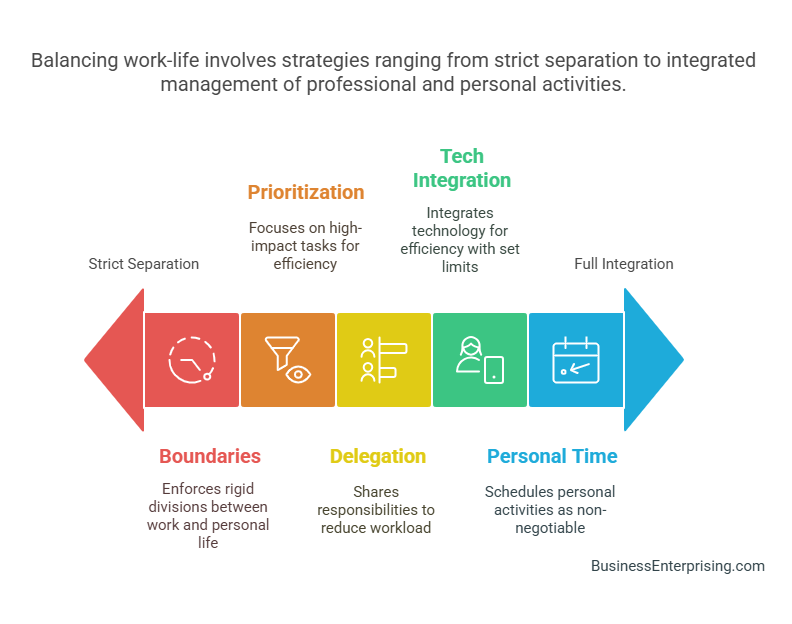 Running a business can be incredibly demanding, often blurring the lines between professional responsibilities and personal life. For many business owners, the pursuit of success can lead to long hours, high stress, and a significant toll on personal well-being. However, maintaining work-life balance is crucial not only for personal health and happiness but also for the sustainable success of the business.
Running a business can be incredibly demanding, often blurring the lines between professional responsibilities and personal life. For many business owners, the pursuit of success can lead to long hours, high stress, and a significant toll on personal well-being. However, maintaining work-life balance is crucial not only for personal health and happiness but also for the sustainable success of the business.
The Importance of Work-Life Balance
Work-life balance is essential for several reasons:
Personal Well-Being: Chronic stress and long working hours can lead to burnout, which negatively impacts physical and mental health. A balanced life ensures adequate time for rest, exercise, and personal pursuits, contributing to overall well-being.
Productivity and Performance: Overworking can also diminish productivity and lead to poor decision-making. Regular breaks and personal time help recharge the mind and body, leading to better performance and creativity.
Family and Relationships: Neglecting personal life can strain relationships with family and friends. Maintaining balance allows business owners to nurture these relationships, providing emotional support and fulfillment.
Sustainable Business Success: A healthy work-life balance can lead to greater job satisfaction and long-term commitment. Business owners who manage stress effectively are better equipped to lead their teams and make strategic decisions for sustained success.
Challenges in Achieving Work-Life Balance
Despite its importance, achieving work-life balance can be challenging for business owners due to:
High Demands: Running a business often requires long hours and attention to multiple tasks, leaving little time for personal activities.
Responsibility and Accountability: The responsibility of managing a business and ensuring its success can create a sense of constant obligation, making it difficult to disconnect from work.
Technology and Connectivity: With the advent of technology, business owners are always connected, making it harder to set boundaries between work and personal life.
Personal Ambitions: The drive to succeed and achieve business goals can lead to a tendency to prioritize work over personal life, contributing to imbalance.
Strategies for Balancing Work-Life
To achieve and maintain a healthy work-life balance, business owners can implement the following strategies:
Set Clear Boundaries: Establish clear boundaries between work and personal time. Designate specific hours for work and stick to them. Communicate these boundaries to employees and clients to manage expectations.
Delegate Responsibilities: Delegation is also crucial for maintaining balance. Trust your team with responsibilities and empower them to make decisions. This not only reduces your workload but also fosters a sense of ownership and accountability among employees.
Prioritize Tasks: Identify and prioritize tasks that are critical to your business’s success. Focus on high-impact activities and delegate or postpone less important tasks. Use tools like to-do lists and project management software to stay organized.
Schedule Personal Time: Just as you schedule meetings and work tasks, schedule time for personal activities, family, and hobbies. Treat this time as non-negotiable to ensure you have regular breaks and opportunities for relaxation.
Embrace Technology Wisely: Use technology to enhance efficiency and productivity, but also set limits. Turn off work-related notifications outside of business hours and avoid checking emails during personal time.
Making Time for a Life
Practice Mindfulness and Stress Management: Incorporate mindfulness practices, such as meditation, yoga, or deep breathing exercises, into your daily routine. These practices can help reduce stress and improve mental clarity.
Take Regular Breaks: Schedule short breaks throughout the day to rest and recharge. Taking regular breaks can prevent burnout as well as maintain productivity levels.
Seek Support: Don’t hesitate to seek support from mentors, peers, or professional networks. Sharing experiences and challenges with others can provide valuable insights and emotional support.
Invest in Professional Development: Continuously improve your skills in time management, delegation, and stress management. Professional development can enhance your ability to maintain balance and lead effectively.
Focus on Health and Wellness: Lastly, prioritize your health by maintaining a balanced diet, exercising regularly, and getting sufficient sleep. A healthy lifestyle supports physical and mental well-being, making it easier to manage work demands.
Maintaining work-life balance is essential for the well-being of business owners and the sustainable success of their businesses. By setting clear boundaries, delegating responsibilities, prioritizing tasks, and scheduling personal time, business owners can achieve a balanced life. Embracing technology wisely, practicing mindfulness, taking regular breaks, seeking support, investing in professional development, and focusing on health and wellness are additional strategies that can help maintain balance.
Achieving work-life balance requires conscious effort and continuous adjustment. However, the benefits of a balanced life—improved well-being, enhanced productivity, stronger relationships, and sustainable business success—make it a worthwhile pursuit. Business owners who prioritize work-life balance not only improve their quality of life but also set a positive example for their teams, fostering a healthy and productive work environment.




